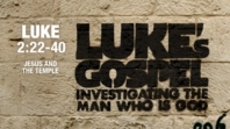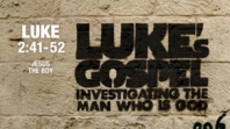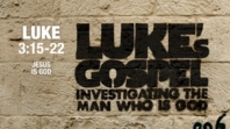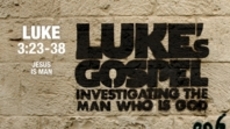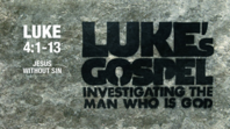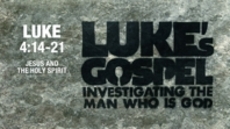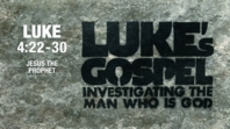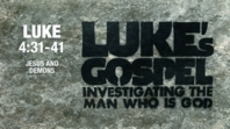
Can’t see the video? Download and install Flash to be able to view. Get Flash Here
Pastor Mark preaches from the Jordan River, where John the Baptizer baptized many, including Jesus Christ. John preached a baptism of repentance to the religious people who came to hear him, whom he called a “brood of vipers.” John urged them to live a life of true repentance instead, which includes conviction, confession, repentance, and restitution. Baptism shows that repentance is made possible through Jesus—his life, death, burial, and resurrection.
3:1 In the fifteenth year of the reign of Tiberius Caesar, Pontius Pilate being governor of Judea, and Herod being tetrarch of Galilee, and his brother Philip tetrarch of the region of Ituraea and Trachonitis, and Lysanias tetrarch of Abilene, 2 during the high priesthood of Annas and Caiaphas, the word of God came to John the son of Zechariah in the wilderness. 3 And he went into all the region around the Jordan, proclaiming a baptism of repentance for the forgiveness of sins. 4 As it is written in the book of the words of Isaiah the prophet,
“The voice of one crying in the wilderness:
‘Prepare the way of the Lord,
make his paths straight.
5 Every valley shall be filled,
and every mountain and hill shall be made low,
and the crooked shall become straight,
and the rough places shall become level ways,
6 and all flesh shall see the salvation of God.’”
7 He said therefore to the crowds that came out to be baptized by him, “You brood of vipers! Who warned you to flee from the wrath to come? 8 Bear fruits in keeping with repentance. And do not begin to say to yourselves, ‘We have Abraham as our father.’ For I tell you, God is able from these stones to raise up children for Abraham. 9 Even now the axe is laid to the root of the trees. Every tree therefore that does not bear good fruit is cut down and thrown into the fire.”
10 And the crowds asked him, “What then shall we do?” 11 And he answered them, “Whoever has two tunics is to share with him who has none, and whoever has food is to do likewise.” 12 Tax collectors also came to be baptized and said to him, “Teacher, what shall we do?” 13 And he said to them, “Collect no more than you are authorized to do.” 14 Soldiers also asked him, “And we, what shall we do?” And he said to them, “Do not extort money from anyone by threats or by false accusation, and be content with your wages.”
The Holy Bible, English Standard Version copyright © 2001 by Crossway Bibles, a publishing ministry of Good News Publishers. Used by permission. All rights reserved. Quotation information.
1 In the fifteenth year of the reign of Tiberius Caesar, Pontius Pilate being governor of Judea, and Herod being tetrarch of Galilee, and his brother Philip tetrarch of the region of Ituraea and Trachonitis, and Lysanias tetrarch of Abilene, 2 during the high priesthood of Annas and Caiaphas, the word of God came to John the son of Zechariah in the wilderness. 3 And he went into all the region around the Jordan, proclaiming a baptism of repentance for the forgiveness of sins. 4 As it is written in the book of the words of Isaiah the prophet,
“The voice of one crying in the wilderness:
‘Prepare the way of the Lord,
make his paths straight.
5 Every valley shall be filled,
and every mountain and hill shall be made low,
and the crooked shall become straight,
and the rough places shall become level ways,
6 and all flesh shall see the salvation of God.’”
7 He said therefore to the crowds that came out to be baptized by him, “You brood of vipers! Who warned you to flee from the wrath to come? 8 Bear fruits in keeping with repentance. And do not begin to say to yourselves, ‘We have Abraham as our father.’ For I tell you, God is able from these stones to raise up children for Abraham. 9 Even now the axe is laid to the root of the trees. Every tree therefore that does not bear good fruit is cut down and thrown into the fire.”
10 And the crowds asked him, “What then shall we do?” 11 And he answered them, “Whoever has two tunics is to share with him who has none, and whoever has food is to do likewise.” 12 Tax collectors also came to be baptized and said to him, “Teacher, what shall we do?” 13 And he said to them, “Collect no more than you are authorized to do.” 14 Soldiers also asked him, “And we, what shall we do?” And he said to them, “Do not extort money from anyone by threats or by false accusation, and be content with your wages.”
All right, welcome to our baptism for Mars Hill Church right here at the Jordan River. I’ll do a theoretically brief teaching out of Luke chapter 3. I know it’s hot; it must be 100 degrees out here.
This is one of the stories that is included in all four Gospels. And so that makes it very, very, very unique. I’ll pray and we’ll get to work.
Father God, I thank you for an opportunity to study the Scriptures in the same place where the Lord Jesus Christ was baptized and where John the Baptizer had so much of his ministry. I pray for those, Lord God, who do know you and will be baptized today, that this would be a memorable, exciting moment in their life. I pray, God, for those who might become Christians through this sermon that they too would enjoy life and eternal life with the Lord Jesus. And, Lord Jesus, we come here not because the site is particularly sacred, but because it reminds us of you. It helps us to understand your life, your ministry, where you were, what you were doing, so that we could understand you deeper; that we could love you; that we, by grace, might belong to you and serve you. And so we ask that this time would be pleasing to you, and we ask this in your good name. Amen.
Well, Luke 3 is around the time of about A.D. 29 and we read this: “In the fifteenth year of the reign of Tiberius Caesar,” – He was the Caesar in the day, and the town of Tiberius is named after him, as was customary in the region. – “Pontius Pilate being governor of Judea, and Herod being tetrarch of Galilee, and his brother Philip tetrarch of the region of Ituraea and Trachonitis, and Lysanias tetrarch of Abilene.” – The key is to read fast and pretend like you’re confident and everyone assumes you know how to pronounce them. – “During the high priesthood of Annas and Caiaphas.” – So he gives us religious and state leaders; goes from those who are national down to those who are local. Gives us some indication of who is in power at the time. And that helps to establish the date at roughly A.D. 29. And then something very important happens, “the word of God came to John the son of Zechariah in the wilderness.”
Now, in Luke 1:76, the man Zechariah prophesied that John would become a prophet who would preach and teach and prepare the way for the coming of Jesus. And here that prophecy comes to fruition as we are told the word of the Lord came to John. That’s a statement in alignment with Old Testament prophecy. I found at least 222 occasions in the Old Testament where it says that the word of the Lord came to someone, usually a prophet. And so this is God revealing himself to the prophets so that they might be his mouthpiece, and on occasion his penmanship, to articulate his message to the world.
So the word of the Lord comes to John. He is the son of Zechariah and we are told that he lives in the wilderness. So he’s not part of this establishment that’s just been mentioned. He just established for us the secular political leadership and the spiritual Judaic leadership of the day. And he says that John really is under the jurisdiction of neither. That’s why prophets tend to walk out of the woods. They don’t belong to Caesar. They don’t belong to the temple. They belong to the Lord, and they can call the nation and they can call the people of God to repentance of sin, because there’s often times corruption.
It goes on to say, verse 3: “And he went into all the region around the Jordan.” – So this entire region. We ultimately know that John did baptize many, including the Lord Jesus, in this river. We know not exactly where. But it was somewhere along this river.
I’ll tell you one thing curious as well. We went on a hike a few days ago. If you go upstream to where the Jordan River begins, it’s actually a combination of two rivers, one at the base of Mt. Hermon, and one at Dan. You’ll hear of the tribe of Dan in the Old Testament. They are about six to seven miles apart. Those two streams will come together and they’ll form the Jordan River that flows down into the Sea of Galilee.
What’s interesting is up at the top of the spring at Mt. Hermon, there’s a temple dedicated to Pan. They would have earthquakes in that region, and the people thought that the god or gods were angry with them-hence the concept of “panic”-and so they built an altar where they would offer blood sacrifices at the fountain of the spring to the god Pan.
And so upstream from this river there was pagan worship that sometimes even those who were Jews participated in. And the result was, when John was baptizing, it is not incomprehensible to think that in the water of the Jordan River would have been blood from sacrifices to the god Pan upstream at the base of Mt. Hermon.
So all this happens in the context of some great paganism and idolatry. “And he went into all the region around the Jordan, proclaiming a baptism of repentance for the forgiveness of sins.” These are the three big ideas. Our problem is sin; we’re not just sinners by choice, we’re also sinners by nature. In Psalms we are told that David declares he was wicked from his mother’s womb, and we, like him, are equally sinners. As Adam’s sons and daughters, his sin nature is transmitted to us, we are by nature sinful. We are by nature sinful. The result is that we commit acts of sin. And the only way to deal with the acts of sin is to deal with the condition of sin. So our problem is sin.
And the answer he tells us is repentance. We’ll deal with that more thoroughly in a moment. But it’s a change of heart and mind. It’s an acknowledgement in light of the holiness and goodness of God that we are sinful, that he is holy, and that that is a problem to him. And repentance is turning from sin to God by faith, through Jesus.
And ultimately, this is all demonstrated in baptism. Let me explain to you briefly baptism. The Jews would have practiced baptism in a few different ways. For the Jews it was for ritual purification, to show cleansing and the like. For those who were Gentile, or non-Jewish converts to Judaism, they would have a proselyte baptism. They would be baptized to identify themselves with the people of God and the cleansing of sin. So for John to be baptizing Jews in a baptism of repentance would have been particularly historically unusual. This would have been an unusual occurrence, that a man who is not a Levite, he’s not part of the priesthood, he’s not working on behalf of the temple, just walks out of the woods, preaches as a prophet of old, people come, repent of sin, and he baptizes Jews. All very unusual.
Goes on to say, “As it is written in the book of the words of Isaiah the prophet.” – And he goes back and he quotes Isaiah chapter 40, and he shows that the prophecy about the coming of one who would prepare the way for Jesus was ultimately fulfilled in the ministry of John, who was Jesus’ cousin. – “The voice of one crying in the wilderness: ‘Prepare the way of the Lord, make his paths straight. Every valley shall be filled, and every mountain and hill shall be made low, and the crooked shall become straight, and the rough places shall become level ways, and all flesh shall see the salvation of God.’”
That God is going to come as our savior, he’s going to save us from sin and the consequences of sin, which include death and damnation. And so it’s important that we have an idea of sin. Sin is our condition by nature. It includes our thoughts, our words, our deeds; omission, that which we fail to do; commission, that which we do that we ought not do. And so it includes all of our spiritual imperfections, all of our moral transgressions against God’s holy law, and his character.
And he says that repentance is the key, and that the way we repent is by the coming of the Lord who will bring salvation. And one will precede him preaching repentance, preparing the hearts of the people for the coming of their savior and messiah.
“He said therefore to the crowds that came out to be baptized by him, ‘You brood of vipers!’” – To call someone a viper is a negative term, particularly for Jews who would have read Genesis and known that from the beginning it’s the serpents and snakes that are prototypical of sin and Satan and rebellion and folly. And these are people who come out to hear him preach, and he is very stern and harsh with them.
He goes on to say, "’Who warned you to flee from the wrath to come? Bear fruits in keeping with repentance. And do not begin to say to yourselves, “We have Abraham as our father.” For I tell you, God is able from these stones to raise up children for Abraham. Even now the axe is laid to the root of the trees. Every tree therefore that does not bear good fruit is cut down and thrown into the fire.’"
Here’s why he is so furious. The people who are coming are religious. This nation to this day knows nothing of this idea. This is a nation of religion. And John called religion a “brood of vipers.” What tends to happen when we think of repentance is all we think of is calling sinners to repent of their sin. So if you’re a drunkard, a glutton, if you’re an adulterer, if you’re a thief, you repent of that and you live a nice pious life. That’s half-true. The other half of the truth is that religious people are to repent of their religion. And these people come to John. These are devout people. They’ve taken their days off of work. They’ve come to hear a preacher. They want to hear a prophet of old. They want to learn about God. They want to be cleansed from their sins. They want to come down into the river and be baptized, and he rebukes them and calls them all a brood of vipers. Why? Because they were religious. The most offensive sins of all are sins of religion. Paul calls them, in Philippians 3, garbage, rubbish, dung. Religion. Religion is man’s effort to please God. Religion is man’s effort to connect with God apart from Jesus. Religion is man’s effort to earn, merit by works, performance, duty, holiness, piety, legacy, the favor of God. And it is a distain to God, because God is a God of grace. God gives not to anyone who is deserving because all are sinners and ill-deserving. God gives love, salvation, mercy, and grace as a gift. And religion wants to earn and merit so that it can be smug and righteous and proud.
You’ll see this when we go in to Jerusalem. People will run you over to get to the Wailing Wall. There will be devout rules, religious rules: what you wear, where you go, what you eat, what you drink. Why? Because if you obey them, you’re closer to God, you’re holier. You’re distinct. You’re better than everyone else.
And I know all of this is very offensive. We worship a guy who got crucified, now you know why. You’ll see men wearing hats, it shows that they are sons of Abraham. Different men wearing different colored hats, showing not only are they sons of Abraham, they follow different rabbis. Different colors signify different rabbis, so not only am I a son of Abraham, I’m better than the other sons of Abraham because I’m under the best rabbi and we have the best rules, and we follow the real traditions, and we’re the most devout, and we’re the most holy. And John says, “brood of vipers.”
And the same thing can happen in Christianity. We make rules that aren’t in the Bible. We subscribe to those rules, thinking that somehow God will be pleased because he wrote a book and we continued in his stead, to add rules and regulations and traditions. And religion is the love of tradition in the place of Jesus. There are people who would much rather cling to their tradition, their history, their ancestry, their place, their lineage, their language, than Christ.
And John says that is all an offense to God. It is the worst sin of all. And what tends to happen is religious people call sinners to repent of their sin and no one ever tells religious people to repent of their religion. That’s why people are attracted to Jesus in a way they’re not attracted to religion. And people are repelled by Jesus in a way they’re not repelled by religion.
Religion ends in pride or despair. You follow all the traditions and manmade rules. If you succeed, you’re arrogant and proud. It’s the worse sin of all. Got Satan cast out of heaven. Or you fail, you’re despairing and grieved and sad because you’re not good enough for God.
When you hear about Jesus, that he lived the life you have not lived, cannot live, will not live, that he died the death that you should have died, and that he rose to give the gift you cannot earn, you’re liberated from religion. Some of you are here, you need to repent of sin. Others of you are here, you need to repent of religion and tradition and manmade rules and legalism and moralism that is apart from the grace of Jesus.
And John does all of this right here at the Jordan River. He calls those who are religiously devout a brood of vipers. Just so you know, I know it’s culturally distant, that’s still not a compliment. That’s a rebuke. That’s a rebuke. And what he says is – [Goose sounds] [Laughter] No one will “Amen,” but the goose is filled with the Spirit and understands. [Laughter] [Goose sounds]
It’s actually interesting. The Celts, they didn’t have a dove, so when they talked about the Holy Spirit, it was the sacred goose. [Laughter] Everything preaches, just go with it. [Laughter]
Now what he says as well is that their answer would be, “Well, we’re the children of Abraham.” And the key is this, was Abraham a Jew or a Gentile? He was a Gentile. He came from the same area where those who built the tower of Babel lived. He, we are told in Acts, likely came from the land of the Chaldeans. He himself was not a worshiper of Yahweh, he was a pagan. And God came to him in grace. God revealed himself to him in grace, and then it says that Abraham trusted, believed, by faith, in the Lord. And it was credited to him as what? Righteousness. Righteousness came to Father Abraham the way it comes to all of us. By faith, not by works. By the works of Jesus, not by our own performance. By his perfection, not by our tradition.
And so when John rebukes them and says, “Don’t tell me Abraham’s your dad. Abraham trusted the coming of Jesus Messiah. You’re not saved by birth,” he’s teaching, “you’re saved by new birth. It’s not who your father is, it’s who your heavenly Father is. It’s not your tradition, your ancestry, your race, your nationality; it’s your savior. It’s about Jesus.”
He then proceeds forward. “And the crowds asked him, ‘What then shall we do?’” – They’re very curious. – “And he answered them, ‘Whoever has two tunics is to share with him who has none, and whoever has food is to do likewise.’ Tax collectors also came to be baptized and said to him, ‘Teacher, what shall we do?’ And he said to them, ‘Collect no more than you are authorized to do.’ Soldiers also asked him, ‘And we, what shall we do?’ And he said to them, ‘Do not extort money from anyone by threats or by false accusation, and be content with your wages.’” Live a life of repentance.
Let me close with a lengthy excursus on repentance.
It starts with conviction. You acknowledge that you are a sinner. The conviction can come through Scripture, preaching, the Holy Spirit, conscience, Christian friends. You realize that you are not living in obedience with God’s character and his commands. So there’s conviction. You feel bad. There’s an acknowledgement in your conscience and in your heart. Something’s wrong and you need to change, and parts of your life need to change.
The next step, number two then, is confession. You talk about it. The Bible says if we confess our sins, he is faithful and just to forgive us our sins and cleanse us of all of our righteousness. You talk about it, with friends, people in your Bible study, family, spouse. You talk about it. And you don’t just talk about sin in general. You talk about the particular sin in your life. Not “Yeah, I’m struggling with some things.” No – “This is a problem area. I want to grow here. This needs to stop. This needs to die. I need to change. I need God’s grace to transform me. I need Jesus’ love to redeem me.”
Conviction. I feel something is wrong. Confession. I talk about it, acknowledge it, I bring it out in the open so that I’m not a hypocrite in secret.
Number three then, there is repentance. Repentance starts in the mind. It’s a change of mind. All of a sudden, Jesus is the center of your life. You’re not the center of your life. You want to do what pleases God, not what satisfies selfish desires. Repentance is literally turning. It’s turning from your face towards sin and your back towards Jesus, to your face towards Jesus and your back towards sin. And it’s an ongoing lifestyle. It’s a continual growing in grace and Christ-likeness. It’s something that continues until Jesus’ final kingdom.
And so when it comes to this issue of repentance, it is the whole of a Christian’s life. Some of you have wrongly been taught that you repent once and are saved, and then do whatever you want for the rest of your life. Repentance is a lifestyle for the Christian. In fact, when the Protestant Reformation came, Martin Luther nailed his Ninety-five Theses to the door of the Wittenberg Cathedral, and the first line was this, “All of a Christian’s life is one of repentance.” All of a Christian’s life is one of repentance.
And today we live in a day when people are not called to repentance. They’re called to tolerance and diversity. Which, to some degree, to love and be gracious and accommodating to people is certainly a good value. But to say, “Well, your sexuality, your finances, your religion, your god, your ideology, your perspective, that’s all okay,” it’s not okay. That’s brood of viper talk. We’re to call people to repentance, not because we hate them, but because we love them. Not so that we can accommodate their sin, but so that we could see it put to death and they live a new life. And so repentance is this great gift that God gives to the Christians.
And what can happen is there are a few counterfeits of repentance. I know it’s hot, I know it’s long. I’ll hit them briefly and I appreciate your kindness.
It’s not mere confession, where you just say you did it and then keep doing it. Some of you are married to that person. “Sorry, sorry, sorry, sorry.” You’re not really sorry. Repentance is changing, not just confessing that you need to.
Number two, true repentance is not religious repentance. Religious repentance is where you see everybody else’s sin. And you repent of everyone else’s sin. It’s dealing with your own sin. Jesus tells the story: two men go into the temple to pray. One says, “God, thank you that I’m better than everyone else.” That’s religious repentance. You’re praying about everyone else’s sin. Some of you are gossips and busybodies. You’re worried about everybody else’s life, everybody else’s business, everybody else’s sin. You want to talk about it. You’ll couch it in prayer? No. That’s religious repentance. True repentance is an acknowledgement of my sin, my need for God’s grace, my need for God’s service and help and salvation. And I’m not judging you. I leave that to him. I might encourage you toward repentance, but my job is not to be preoccupied with your sin. I’m preoccupied with my own and have plenty to deal with.
Additionally, number three, true repentance is not worldly sorrow. Paul tells the Corinthians that they are practicing worldly sorrow or the ESV will call it worldly grief. This is where you feel bad, but you don’t change. The Holy Spirit doesn’t come in. There’s not a new heart. Not a new life. Not new desires. Not a new Lord. And the result is you feel bad. And non-Christians feel bad, and we have this sort of confessional where if you do a bad thing, and you’re a celebrity, you go on TV, you sit with Barbara Walters, or Oprah, or you sit on the View or with Larry King, and you cry and you say you feel bad, and then you make a large donation to some charitable organization. And everybody says, “Well, they felt bad, glad that’s over.” That’s not repentance. That’s worldly sorrow. You feel bad. But you don’t change.
Number four. It is not pagan repentance. Pagan repentance is where you’re repenting so that God will bless you. The pagans would try and manipulate God to bless them. So you say, “I want to be healthy. I want to be rich. I want to be successful. I want to get married. I want my kids to obey. I’ll repent, I’ll tell God I’m sorry so then he’ll give me something.” That’s pagan repentance. That’s trying to manipulate God to be good. God is good and does not need to be manipulated.
Number five. It is not general repentance. General repentance is where someone commits a sin and you say, “Look, you did this, this was wrong and it hurt some people, you need to fix it.” And then they’ll generally repent, “Yeah, well, nobody’s perfect, we all make mistakes.” No, it’s specific repentance of specific things.
And lastly, number six, it is not excuse-making. It’s not excuse-making. “I sin because my genetics predisposed me toward alcoholism, or gluttony, or anger. I’m Italian, we get angry. I’m Greek, we get angry. I’m Spanish, we get angry. I’m Irish, we get angry.” It’s amazing how every group has this exception clause. [Laughter]
“Well, you know, this is my personality.” Now we have personality types. “My personality is unpleasant and mean and harsh. And that’s my personality type.” [Chuckles] You know? “There’s ENTP, ENTJ, I’m a J-E-R-K. That’s my personality type.” [Laughter]
We come up with all- Sometimes it is very simple excuses. It starts when you’re a child. You’ll see this with children. “Why did you hit them?” “They made me hit them.” “Really? They like took your fist and punched themselves in the face?” “No. They had a toy that I wanted so I punched them.” “Well, they didn’t technically make you hit them.” It starts when we’re little. We have excuses. We blame shift. We shift the burden to others. We change the subject. Repentance says, “No, I’m a sinner. That’s true. I need to change. Sorry about that. Please forgive me. Jesus forgives me. Help me. Jesus, help me. I want to change, deeply want to change.”
And then ultimately it results from conviction to confession, to repentance, to restitution. This isn’t penance where you’re paying back. Restitution is, as he says here, if you’ve been ripping off, stop ripping them off. If you’ve been stealing things, stop stealing things. If you’ve been greedy and coveting, stop coveting and celebrate the blessing of God in the life of others. It’s an ongoing lifestyle of repentance that can include restitution. Trying to go back and apologize to people and tell them you’re sorry. And pay back what you’ve stolen. And make amends. And when they ask why, say, “You know, Jesus loves me. My sin was so grievous, he died for me. And he sent me here to apologize and I know I can’t make it right, but I just want to show that I am sorry and I have changed. And I would like you to forgive me as God has forgiven me in Christ.” And it’s a demonstration of the gospel of grace.
Now, that being said, he is preaching all of this, and who comes down to be baptized? The Lord Jesus Christ. It’s in the next section of Luke’s Gospel. And he’s not being baptized for the repentance of his sin. But for at least two reasons: to identify with the ministry of John, that he’s fulfilling it; and two, to foreshadow his own death, burial, resurrection, so that repentance would be possible. The penalty for sin is death. Either we die or he dies. Either way, the price must be paid. And so, in being baptized, Jesus is showing, “All of your repentance and the cleansing that you desire and the new life that you’re longing for, I’m going to make that possible. This baptism is about me.” Baptism is about Jesus. So when we baptize people today, it’s all about him. It’s not about religion or tradition, or getting wet or cooling off, as glorious as that would be. [Laughter]
It’s not about doing this so that God would love you. It’s not about doing this so that God would save you. It’s not about doing this so that God would forgive you. It’s not about doing this so that God would care for you. It’s in Christ that he has. That all your sins are forgiven in Jesus. That you are loved and embraced by God.
And baptism is showing that repentance is made possible through Jesus. That as he was alive, dead, buried, and raised, cleansing us from sin, when we have faith in him, repentance to him, we’re baptized in the name of the Father and the Son and the Holy Spirit, just like he said at the end of the great commission. The whole Trinity was there at the baptism of Jesus. The Father speaks from heaven, over the glorious Jordan River: “This is my son, in whom I am well pleased.” Jesus comes up out of the water; the Holy Spirit descends upon him in the form of a dove. It’s all about the Trinitarian God of the Bible. Loving, saving, seeking, serving sinners. It’s amazing. So the whole thing is about Jesus. And I would love to baptize any of you who are Christians or repent of sin and trust in Jesus and covenant with me to walk with him for the rest of your days on earth and hereafter.
And I want to be very careful that we don’t turn this into a religious ceremony. You know, I’ll just say this because we’re going to go home, and they’ll never find me. [Laughter] But places like this get turned into religious places, don’t they? You got to pay to wear a certain thing to get baptized. You got to pay to use the bathroom. You got to pay to use everything. Why? Because sometimes religion creeps in. In spite of the religion that surrounds us, we’re here for Jesus. And we don’t want to be disrespectful or angry or mean-spirited. But at the same time, we don’t want to be converted. We don’t want to be converted to religion because ultimately under religion, it’s always about the money. The place is special. The people go there. You’re charged for things. It’s good business. Jesus found that in the temple, and lost his mind. In a sanctified, holy, and perfect way. [Laughter]
And so we come to this site to remember Jesus, but I want to be careful that none of you seeks baptism in a religious way. “Oh, now God will love me, now God will save me, now God is close to me.” No, all of that is taken care of in Jesus. This is to show that when he died, you died. When he rose, he gave you new life. And one day, you’ll be buried as he was buried, and if you belong to him, you’ll rise to be with him, for him, like him, forever. Forever.
So- we won’t baptize babies. It never happened in the Bible. It never happened in the Bible. Additionally, when it says that households were baptized, they were old enough to believe the Lord and serve the Lord, so we don’t practice infant baptism. Not because it’s wrong, but because it’s wrong. Okay? [Laughter]
Now additionally, we’re going to dunk people. We’re not going to sprinkle, because all of the baptisms in the Bible, including Jesus’, were dunkings. In fact, I think it’s the Danish translation of the Bible, calls John, “John the Dunker.” [Laughter] One of the ancient Greeks wrote a story about a ship sinking, and he said it was baptized. Okay? So, we don’t sprinkle. We dunk like Jesus did, and we dunk believers who’ve repented of sin and trusted in Jesus.
And in a moment, I’ll pray, and we’ll go ahead and do that for any of you who are called of God to do that. And I get the pleasure today of baptizing my son, Buddy Calvin, love you Buddy. I’m going to cry. [Laughter] I’m going to baptize my dad. I’m going to baptize my mom. And we’ll see many of you baptized as well. Are you ready for that?
>> Yeah.
>> Hey, Buddy Calvin, why don’t you come down here with me. I’ll pray, and we’ll dunk you first, big boy. Come here, buddy. [Clapping]
Father God, I thank you that we get an opportunity to remember Jesus today. I thank you, Lord Jesus, that in baptism we get to remember your life, death, burial, resurrection, in our place, for our sins, and I pray, Lord God, that this would be a special time for us to connect with the Lord Jesus, in whose name we pray. Amen.
[End of Audio]
Note: This sermon transcript has been edited for readability.

Special Generous Presentation from Pastor Mark
December 13, 2009
